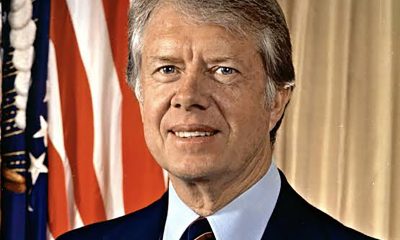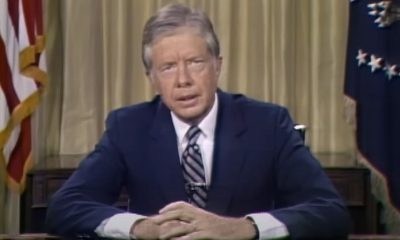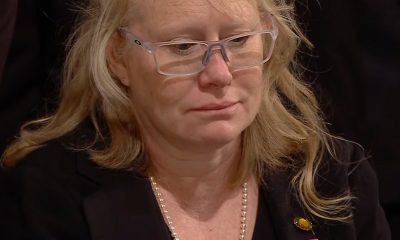Politics
Former President Jimmy Carter has entered hospice care
Carter Center made announcement on Saturday
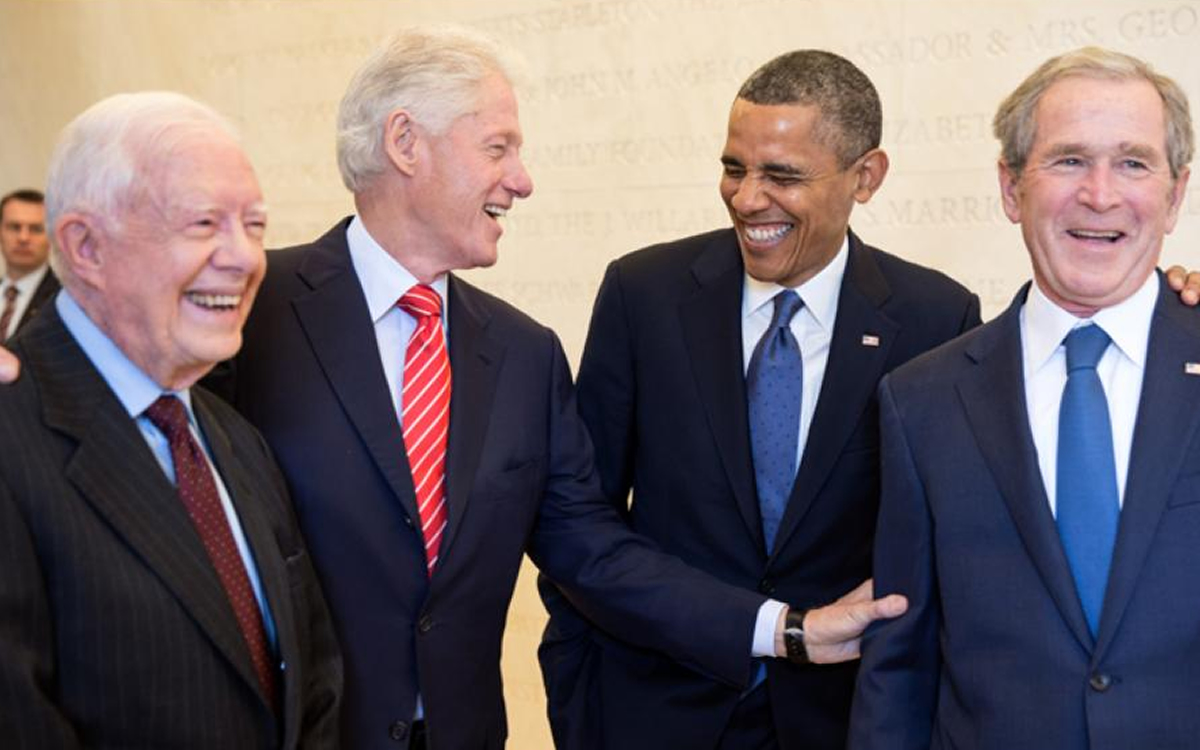
Former President Jimmy Carter has elected to receive hospice at his home in Plains, Ga., according to the announcement by the Carter Center in Atlanta. The 98-year-old former president, who has been in ill health recently and hospitalized several times, decided to spend his remaining time at home with his family.
The Carter Center said that the former president had elected to decline additional medical intervention and that he has the full support of his family and his medical team.
The former president’s grandson, former Georgia state Sen. Jason Carter tweeted: “I saw both of my grandparents yesterday. They are at peace and — as always — their home is full of love. Thank you all for your kind words”
I saw both of my grandparents yesterday. They are at peace and—as always—their home is full of love. Thank you all for your kind words https://t.co/9rhG61sZEV
— Jason Carter (@SenatorCarter) February 18, 2023
Carter became the oldest living former U.S. chief executive after the death at age 94 of former President George H.W. Bush on Nov. 30, 2018. He was diagnosed with cancer in Aug. 2015 — melanoma that had spread to his liver and brain — but was later declared cancer-free. In 2019, he also suffered a black eye in a fall and was later hospitalized with a fractured pelvis due to a separate fall.
Carter’s 76-year-long marriage makes him the longest-married U.S. president on record.
The 39th president of the U.S., he served from 1977-1981. After leaving office in 1982, he and his wife Rosalynn founded the Carter Center, a nonprofit organization dedicated to improving the lives of people around the globe. The former president was awarded the Nobel Peace Prize in 2002 for his life-long advocacy for human rights.
The announcement by the Nobel Committee stated that the committee decided to award the Nobel Peace Prize for 2002 to Carter, “for his decades of untiring effort to find peaceful solutions to international conflicts, to advance democracy and human rights, and to promote economic and social development.”
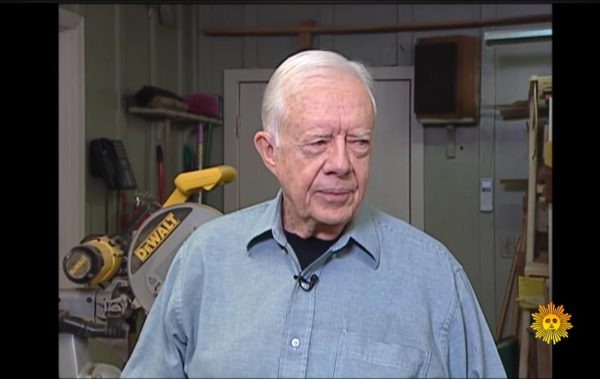
Modest beginnings
Born Oct. 1, 1924, at the Wise Sanitarium [hospital] in his hometown of Plains, Ga., where he was raised on his parent’s peanut farm, Carter’s decades of public service commenced after his graduation from the U.S. Naval Academy in 1946 and he began his service as a submariner.
Carter left naval service after the death of his father in 1953 taking over the Carter family business in what was then a segregated Georgia with sharp lines between Blacks and Whites. He was an early supporter of the nascent civil rights movement and became an activist within the Democratic Party, a leading voice of change to end racial segregation.
First elected to office in 1963, Carter served as a state senator until 1967. In 1970 he successfully ran for governor, winning the office and then going on to serve until 1975. Like most progressive Democrats of the era, Carter was appalled by U.S. foreign policy in Vietnam and then by the scandal of Watergate that took down the Republican administration of President Richard Nixon leading to the president’s resignation in August 1974.
Previous to the Watergate scandal in 1972, Carter was selected to lead as chair of the Democratic Governor’s Campaign Committee. This position gave him access to key Democrats nationwide, and the major Democratic gains in the first post-Watergate election allowed Carter to raise his visibility nationally.
Presidential politics
Although a relative unknown outside of Georgia and within the leadership of the Democratic Party, Carter was able to parlay voter fatigue and the public’s response to the twin nightmares of Vietnam and Watergate, that had shattered public confidence in government into setting up his run against incumbent Republican President Gerald Ford.
Robert A. Strong, professor of politics at Washington and Lee University and a visiting fellow at the University of Virginia’s Miller Center noted: [In the 1976 presidential race] Americans gravitated toward leaders who were outside the Washington sphere. Answering the nation’s need, Carter’s slogan was “A Leader, For A Change.” Nine other Democrats were seeking the nomination in 1976, most of them better known than Carter.
Early support of gay rights
During a campaign stop on May 21, 1976, Carter was giving a fundraising campaign speech at the Hilton hotel in San Francisco when he met local gay rights activist Harvey Milk. The moment was caught by famed San Francisco-based gay photographer Donald C. Eckert as Carter shook Milk’s hand.
According to Jimmy Carter Presidential Library researcher Dale Dancis, Eckert, speculated that “Carter and his aides had no idea who Harvey was at the time. (Milk) had scraped together the $100 or so for the fund-raising dinner so he could meet Carter.”
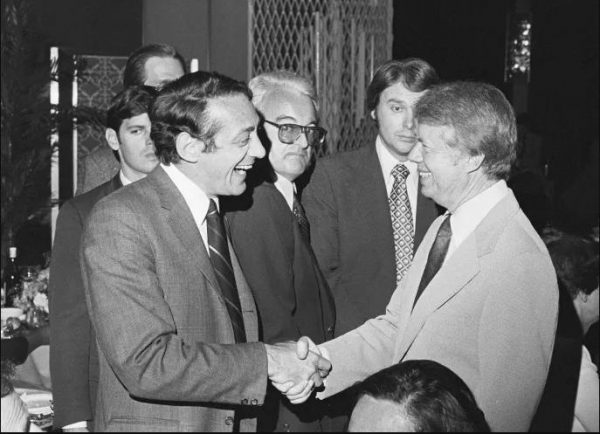
(Photo Credit: Donald C. Eckert/ National Archives and Records Administration and Harvey Milk Foundation)
The Jimmy Carter Presidential Library has a recording of Carter’s speech from that night, which doesn’t mention gay rights. However, Carter spoke out in support of gay rights at the news conference he held just before the fund raiser, saying he would sign New York Democratic Congresswoman Bella Abzug’s Equality Act amendment to the 1964 Civil Rights Act if it reached his desk. “I will certainly sign it, because I don’t think it’s right to single out homosexuals for special abuse or special harassment,” he said.
In the outcome of the 1976 presidential election, Carter narrowly defeated Ford, in part due to the latter’s pardoning of his predecessor president Nixon, but also as the inflation rate in 1976 topped 5.76 percent and the American economy had significantly slowed.
Washington and Lee’s professor Strong wrote: “The election was very close. Ford’s strategy was to try to win five of eight elector-rich states: California, Illinois, Michigan, New Jersey, New York, Ohio, Pennsylvania and Texas. He won four, but not five. Carter won with an interesting coalition of the entire Old South (excepting conservative Virginia) and northern industrial powers such as New York and Pennsylvania.”
Carter later factored into a gay rights campaign by Milk, when, as an elected city supervisor for the Castro (District 5) in San Francisco in 1978, wrote the president asking for his support in defeating ballot Proposition 6, which would have banned gay and lesbian individuals from working in the California public school systems as teachers or staff.
Proposition 6, was also known as the Briggs Initiative — named after Republican state Sen. John Briggs who had authored the legislation. In his letter Milk stressed that he hoped that the president would oppose the Briggs Initiative and “take a leadership role in defending the rights of gay people.”
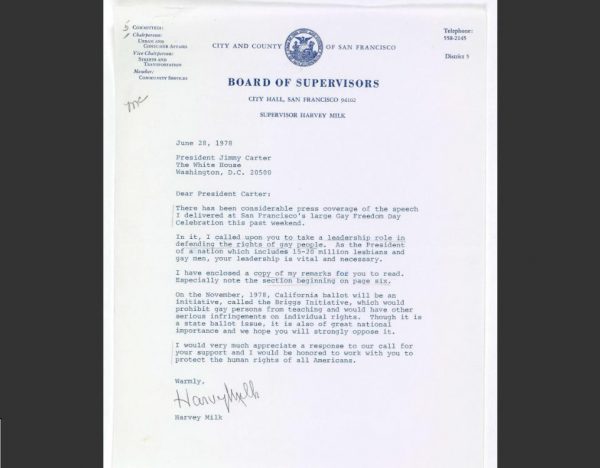
A couple of days before sending the letter Milk expressed his frustration over what he perceived as inaction by the Carter White House on gay rights in a speech he gave on June 28, 1978, that later was known as the “Hope Speech.” Milk targeted Sen. Briggs and Florida resident and anti-gay activist Anita Bryant for her national Save Our Children campaign which labeled gay and lesbian Americans as deviants.
“… There are some 15 to 20 million lesbians and gay men in this country listening and listening very carefully. Jimmy Carter, when are you going to talk about their rights?” Milk told the crowd in front of San Francisco City Hall that bright June morning.
In his letter to Carter after the speech Milk wrote: “In it, [Milk’s speech] I called upon you to take a leadership role in defending the rights of gay people. As the president of a nation which includes 15-20 million lesbians and gay men, your leadership is vital and necessary.”
Camp David Accords and the push for peace in the Middle East
Carter’s presidency saw the creation of two new federal cabinet-level roles — the Departments of Energy and Education. Carter also focused efforts on bringing peace to the troubled regions in the Middle East.
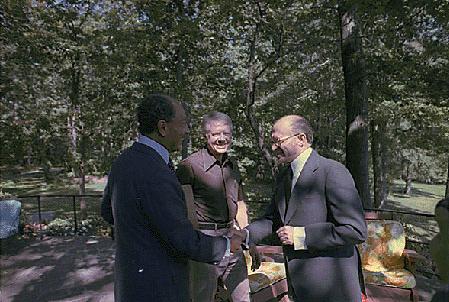
The Camp David Accords, signed by Carter, Egyptian President Anwar Sadat, and Israeli Prime Minister Menachem Begin in September 1978, established a framework for a historic peace treaty concluded between Israel and Egypt the next spring in March 1979.
Carter along with his Secretary of State, Cyrus Vance, pursued intensive negotiations with Arab and Israeli leaders, hoping to reconvene the Geneva Conference, which had been established in December 1973 to seek an end to the Arab-Israeli dispute after decades of bloody and costly conflict.
His presidency however would be marred by a series of events that critics would charge showed Carter’s inability to govern effectively as well as manage the massive and somewhat unwieldy Federal government. 1979 proved to be challenging to Carter as he was confronted by the oil crisis brought about by the revolution in Iran that toppled Shah Mohammad Reza Pahlavi and installed a fundamentalist Islamic regime, the Three Mile Island nuclear accident, the Nicaraguan revolution and the Soviet invasion of Afghanistan.
Ultimately it was the revolution in Iran and the take-over of the U.S. Embassy in Tehran on Nov. 4, 1979, and the hostage-taking of 52 U.S. diplomats and citizens by militant Iranian college students and youths supported by the government of Ayatollah Khomeini, that proved to leave a negative impact on Carter’s chances for reelection.
The campaign and election of 1980
Writing about that campaign, Strong noted: “Three days after the embassy takeover in Iran, Sen. Edward Kennedy of Massachusetts announced his candidacy for the Democratic presidential nomination. Incumbents rarely face a challenge from within their own party, but Kennedy was encouraged by Carter’s weak poll ratings. When told of the Kennedy challenge, Carter snapped to a congressman, who later spoke to reporters: “I’ll whip his ass.” Kennedy came close to defeating Carter as the party split into two wings.”
In the fall of 1980 Republican nominee former California Gov. Ronald Reagan won in an electoral landslide. Many political observers an historians believe that Carter’s record in office despite his successes with Middle East negotiations for peace belied the fact that he was a below-average president.
The final straw in dooming his chances for a second term for his presidency some historians said was that in addition to his seeming inability to gain the release of the American hostages held in Tehran, the final debate between the president and Reagan capped what would become his defeat at the polls.
Reagan was an infinitely superior television candidate. Someone asked Carter a question about the arms race with the Soviets, and he claimed that he had helped decide policy towards it by discussing it with Amy, his eight-year-old daughter. When Carter acted querulous and sounded shrill, Reagan turned to him and said in a mock tone of exasperation, “There you go again.” At the end of the debate, Reagan looked into the camera expertly and asked viewers, “Are you better off than you were four years ago?” The next day, Carter was stunned at the latest poll numbers-the very bottom had dropped out.
The Carter Center and post-presidency career
Carter’s years after leaving the White House has been filled with years of work dedicated to his passion for the advancement of human rights, peace negotiations, monitor elections, and advancing disease prevention and eradication in developing nations. Much of that charitable work advanced by the Carter Center’s efforts in more than 65 developing countries.
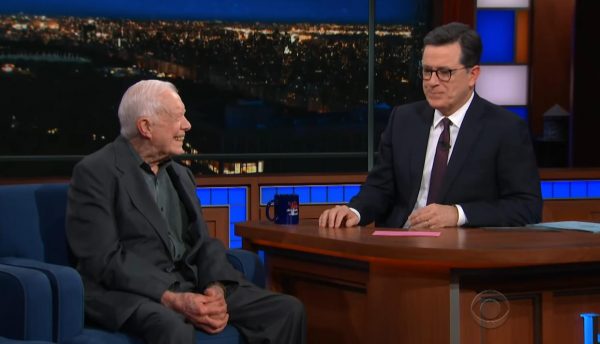
A published author, Carter has written over 30 books, ranging from political memoirs to poetry, and he and his wife Rosalynn are also celebrated for their hands on work with the nonprofit organization Habitat for Humanity, a nonprofit organization dedicated to providing home ownership opportunities to low-income families.
Both have been publicly documented lending their labor and time on the construction of new homes by Habitat for Humanity.
Carter has continued to lend support and allyship to the LGBTQ community. During a book tour promoting his book, “A Full Life: Reflections at Ninety,” speaking with HuffPost Live in July 2018, the former president was asked about gay marriage said he believes “Jesus would approve of gay marriage.”
“I think Jesus would encourage any love affair if it was honest and sincere and was not damaging to anyone else and I don’t see that gay marriage damages anyone else,” Carter who describes himself as a born-again Christian said adding though as a caveat churches that disagree with same-sex marriage should not have to perform them.
Jimmy Carter says Jesus would approve of marriage equality:
Carter is still praying for Donald Trump
From 2006: Jimmy Carter on life after the White House
Congress
Congress passes ‘Big, Beautiful Bill’ with massive cuts to health insurance coverage
Roughly 1.8 million LGBTQ Americans rely on Medicaid

The “Big, Beautiful Bill” heads to President Donald Trump’s desk following the vote by the Republican majority in the U.S. House of Representatives Thursday, which saw two nays from GOP members and unified opposition from the entire Democratic caucus.
To partially offset the cost of tax breaks that disproportionately favor the wealthy, the bill contains massive cuts to Medicaid and social safety net programs like food assistance for the poor while adding a projected $3.3 billion to the deficit.
Policy wise, the signature legislation of Trump’s second term rolls back clean energy tax credits passed under the Biden-Harris administration while beefing up funding for defense and border security.
Roughly 13 percent of LGBTQ adults in the U.S., about 1.8 million people, rely on Medicaid as their primary health insurer, compared to seven percent of non-LGBTQ adults, according to the UCLA School of Law’s Williams Institute think tank on sexual orientation and gender identities.
In total, the Congressional Budget Office estimates the cuts will cause more than 10 million Americans to lose their coverage under Medicaid and anywhere from three to five million to lose their care under Affordable Care Act marketplace plans.
A number of Republicans in the House and Senate opposed the bill reasoning that they might face political consequences for taking away access to healthcare for, particularly, low-income Americans who rely on Medicaid. Poorer voters flocked to Trump in last year’s presidential election, exit polls show.
A provision that would have blocked the use of federal funds to reimburse medical care for transgender youth was blocked by the Senate Parliamentarian and ultimately struck from the legislation — reportedly after the first trans member of Congress, U.S. Rep. Sarah McBride (D-Del.) and the first lesbian U.S. senator, Tammy Baldwin (D-Wis.), shored up unified opposition to the proposal among Congressional Democrats.
Congress
Ritchie Torres says he is unlikely to run for NY governor
One poll showed gay Democratic congressman nearly tied with Kathy Hochul

Gay Democratic Congressman Ritchie Torres of New York is unlikely to challenge New York Gov. Kathy Hochul (D) in the state’s next gubernatorial race, he said during an appearance Wednesday on MSNBC’s “Morning Joe.”
“I’m unlikely to run for governor,” he said. ““I feel like the assault that we’ve seen on the social safety net in the Bronx is so unprecedented. It’s so overwhelming that I’m going to keep my focus on Washington, D.C.”
Torres and Hochul were nearly tied in a poll this spring of likely Democratic voters in New York City, fueling speculation that the congressman might run. A Siena College poll, however, found Hochul leading with a wider margin.
Back in D.C., the congressman and his colleagues are unified in their opposition to President Donald Trump’s signature legislation, the “Big Beautiful Bill,” which heads back to the House after passing the Senate by one vote this week.
To pay for tax cuts that disproportionately advantage the ultra-wealthy and large corporations, the president and Congressional Republicans have proposed massive cuts to Medicaid and other social programs.
A provision in the Senate version of the bill that would have blocked the use of federal funds to reimburse medical care for transgender youth was blocked by the Senate Parliamentarian and ultimately struck from the legislation, reportedly after pressure from transgender U.S. Rep. Sarah McBride (D-Del.) and lesbian U.S. Sen. Tammy Baldwin (D-Wis.).
Torres on “Morning Joe” said, “The so-called Big Beautiful Bill represents a betrayal of the working people of America and nowhere more so than in the Bronx,” adding, “It’s going to destabilize every health care provider, every hospital.”
Congress
House Democrats oppose Bessent’s removal of SOGI from discrimination complaint forms
Congressional Equality Caucus sharply criticized move

A letter issued last week by a group of House Democrats objects to Treasury Secretary Scott Bessent’s removal of sexual orientation and gender identity as bases for sex discrimination complaints in several Equal Employment Opportunity forms.
Bessent, who is gay, is the highest ranking openly LGBTQ official in American history and the second out Cabinet member next to Pete Buttigieg, who served as transportation secretary during the Biden-Harris administration.
The signatories to the letter include a few out members of Congress, Congressional Equality Caucus chair and co-chairs Mark Takano (Calif.), Ritchie Torres (N.Y.), and Becca Balint (Vt.), along with U.S. Reps. Nikema Williams (Ga.), Hank Johnson (Ga.), Raja Krishnamoorthi (Ill.), Delia Ramirez (Ill.), Joyce Beatty (Ohio), Lloyd Doggett (Texas), Eleanor Holmes Norton (D.C.), Josh Gottheimer (N.J.), and Sylvia Garcia (D-Texas).
The letter explains the “critical role” played by the EEO given the strictures and limits on how federal employees can find recourse for unlawful workplace discrimination — namely, without the ability to file complaints directly with the Employment Opportunity Commission or otherwise engage with the agency unless the complainant “appeal[s] an agency’s decision following the agency’s investigation or request[s] a hearing before an administrative judge.”
“Your attempt to remove ‘gender identity’ and ‘sexual orientation’ as bases for sex discrimination complaints in numerous Equal Employment Opportunity (EEO) forms will create unnecessary hurdles to employees filing EEO complaints and undermine enforcement of federal employee’s nondiscrimination protections,” the members wrote in their letter.
They further explain the legal basis behind LGBTQ inclusive nondiscrimination protections for federal employees in the EEOC’s decisions in Macy v. Holder (2012) and Baldwin v. Foxx (2015) and the U.S. Supreme Court’s decision in Bostock v. Clayton County (2020).
“It appears that these changes may be an attempt by the department to dissuade employees from reporting gender identity and sexual orientation discrimination,” the lawmakers wrote. “Without forms clearly enumerating gender identity and sexual orientation as forms of sex discrimination, the average employee who experiences these forms of discrimination may see these forms and not realize that the discrimination they experienced was unlawful and something that they can report and seek recourse for.”
“A more alarming view would be that the department no longer plans to fulfill its legal obligations to investigate complaints of gender identity and sexual orientation and ensure its
employees are working in an environment free from these forms of discrimination,” they added.

